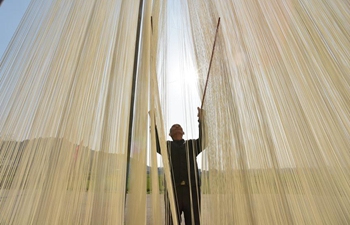
Spokesman for the Atomic Energy Organization of Iran Behrouz Kamalvandi speaks during an exclusive interview with Xinhua in Tehran, Iran, on Dec. 20, 2017. Iran would keep its right to strike back if the United States is not going to suspend the sanctions against Iran, the spokesman for Atomic Energy Organization of Iran said in an exclusive interview with Xinhua on Wednesday. (Xinhua/Ahmad Halabisaz)
TEHRAN, Dec. 20 (Xinhua) -- Iran would keep its right to strike back if the United States is not going to suspend the sanctions against Iran, the spokesman for Atomic Energy Organization of Iran, said in an exclusive interview with Xinhua on Wednesday.
"We are committed to our obligations and we are going to fulfill all our responsibilities," Behrouz Kamalvandi said the nuclear deal had secured Iran's benefits and the United States should respect its pertinent obligations.
However, if there are any signs of infringement of the deal, Iran will consider its own options, he said.
The the landmark nuclear agreement, known as the Joint Comprehensive Plan of Action (JCPOA), is a multilateral document which was achieved after months of diplomatic efforts and approved by the UN Security Council.
The deal resulted in the removal of international and western financial and economic sanctions against Iran and imposed more restrictions on its controversial nuclear program.
For instance, "if by Jan. 14 next year, they are not going to suspend the (new) sanctions (against Iran), it means that they have exited the deal. So, naturally, it is the right of us to do whatever is needed and to retaliate," Kamalvandi added.
U.S. President Donald Trump said in October that the United States could not formally certify Iran's compliance with the nuclear accord. The U.S. Congress is expected to decide whether to continue suspending the sanctions against Iran.
Washington has also demanded inspections of Iran's military sites, which Tehran has rejected.
"So far, the United States have tried to put pressures" on Iran. The Iranian atomic official alleged that the United States has not respected some articles of the JCPOA, which recognizes Iran's right to take advantage of the benefits of the deal.
The United States has not respected several articles, such as article 26, 28 and 29 of the JCOPA, he said, adding that it has contradicted its own commitments, which prevents Iran from the benefits of the removal of sanctions.
The United States has tried a number of ways to prevent Iran from the benefits of the deal, Kamalvandi said, stressing that "the accord is not just about limitations (on Iran's nuclear activities), it is also about modernization a development" of peaceful nuclear energy program.
Iran's top officials have warned the United States of the repercussions of scrapping the nuclear deal by reimposing sanctions against the Islamic republic several times before.
Otherwise, over the past months, the U.S. administration has imposed sanctions on some individuals and companies accusing them of counterfeiting money for Iran and cooperating with Tehran over its ballistic missile program.
He has called the Iran nuclear deal, reached during the former U.S. president Barack Obama administration, "an embarrassment" for the United States and has called for renegotiations over some parts of it.
"We expect the other side also to respect its commitments," Kamalvandi said. "Something is very clear for us: as long as the other side continues to observe their responsibilities and commitments, we will, of course, respect this deal."
In the meantime, Kamalvandi expressed the hope that "we think there are still rooms for preservation of deal since the majority of the world supports it," he concluded.















